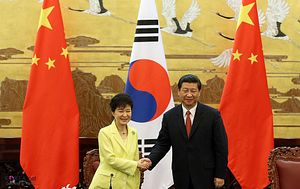Last week, a Chinese fishing boat captain died in a violent clash between Chinese fishermen and armed South Korean coast guard officers. According to media reports, the captain was shot and killed by a South Korean coast guard officer who fired his pistol several times. Although the details are still unclear, the death is a painful fact, especially for the family of the Chinese captain.
Meanwhile, media outlets from both China and South Korea say both sides have agreed that this unfortunate incident should not negatively affect China-South Korea relations, which have been at an historic high point. This incident probably will not (and should not) cause too much disruption to the bilateral relationship between these two neighbors. Still, two points stand out upon close examination of this tragedy.
First, there are humanitarian concerns. These fishermen are not pirates, even if they truly crossed the temporary line defined by the fishery agreement between China and South Korea (this line is temporary, as China and South Korea have yet to reach a final agreement on the boundaries of their respective Exclusive Economic Zones, which overlap substantially). Although their reactions toward South Korean coast guard officials might have turned violent, they are still fishermen who are also sons, husbands, and fathers. As China-South Korea continue to hold dialogues on fishing boundaries, both sides should approach such run-ins in a more moderate and humanitarian way, rather than to fighting to the death in violent confrontations. All parties should know how to protect themselves in a safe and wise way in extreme situations.
According to South Korea’s JoongAng Daily, South Korean assemblyman Hwang Ju-hong questioned why the South Korean coast guard officers did not use electric stun guns. The coast guard has been equipped with these non-lethal weapons for years but has rarely used them. Hence, a thorough investigation by South Korea, with a focus on humanitarian concerns, is both necessary and wise. Yes, these Chinese fishermen resisted violently, but they were facing coast guard officers armed with guns. Viewed from another angle, fishery clashes will only bring about economic losses, while inappropriate enforcement and actions by armed coast guard officers can result in unintended, uncontrollable escalation and even the loss of human lives.
Of course, in 2011 a young Korean coast guard officer unfortunately lost his life in a violent clash with Chinese fishermen, and that loss was not any less tragic than this year’s incident. It is time for both sides to seriously seek wiser and more humanitarian ways to stop these violent confrontations, which have brought tremendous pain to families on both sides of the Yellow Sea. Any further loss of life, whether Korean or Chinese, will be hard to accept.
Second, despite warm official rhetoric, there are potential pitfalls in China-South Korea relations, particularly at the level of public opinion. These violent fishery clashes are symptoms of hidden worries in the current Beijing-Seoul honeymoon. These destabilizing factors may not immediately damage the close ties between Beijing and Seoul, but they will greatly impact future relations if not addressed seriously and cautiously.
In comparison, there have been many minor clashes between Seoul and Washington, for example on economic or civil issues, but both countries find appropriate approaches to address the tensions and reach consensus. The long history of Seoul-Washington relations and the evolving ROK-U.S. alliance have made it possible for both parties to create institutional solutions within a stable and functional framework. Hence it is not surprising to see that the South Korean public consistently views the United States more favorably than any other country, according to the Asan Institute.
Both China and South Korea should work together to seek a similar, stabilized framework at both the strategic and policy levels in order to truly coexist as good neighbors (and possibly take their relationship beyond that). With an institutional framework in place, occasional violent clashes and other individual cases would have little chance to undermine government consensus and sway public opinion.
Of course, it will be very difficult for both China and South Korea to define and construct such a cooperative framework in the long term. Doing so naturally involves complex calculations at the strategic level regarding mutual perceptions, positioning, and national interests in addition to coordinating effectively at the policy level with regard to various practical issues (including fishery agreements). However, without such a long-term cooperative framework, Sino-ROK relations cannot be truly stable.

































